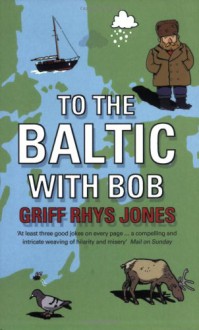The historian Macaulay once remarked that the British navy of Pepys' day was staffed by gentlemen and seamen: the seamen were not gentlemen and the gentlemen were not seamen. Comedian Griff Rhys Jones, and theBob of To the Baltic with Bob, would fall, decidedly, into the "gentlemen" category of...
show more
The historian Macaulay once remarked that the British navy of Pepys' day was staffed by gentlemen and seamen: the seamen were not gentlemen and the gentlemen were not seamen. Comedian Griff Rhys Jones, and theBob of To the Baltic with Bob, would fall, decidedly, into the "gentlemen" category of mariner: enthusiasts, amateurs in the original sense of the word and therefore, naturally, inept sailors. (Rhys Jones pins the blame for his obsession with all things nautical on Arthur Ransome and on his late father, who made the freezing West Mercia boat park the family's home from home.) Luckily for Rhys Jones, his mate Bob is a marginally worse yachtsman. And in this record of a summer voyage from the Thames estuary to St Petersburg, Bob, the ex-hippie entrepreneur with a beguilingly childlike urge to possess Scando-Soviet tat (canned reindeer, Russian amphibious vehicles etc) is cast as Passepartout to Rhys Jones's Phileas Fogg. The pair are assisted on their journey by Baines, a technical wizard whose abilities, as Jones says, "certainly drew attention to our own deficiencies". Rick, an anally retentive chartsman, is also around until the point at which, like a commissar in a Politburo photograph, he vanishes following a testy disagreement with the author about "Baltic surge". The wayward sea, estuary and canal route through Holland, Denmark, Latvia, Finland, Russia and the Turko Archipelago--"so topographically complex that it was expedient not to draw it"--results, predictably, in a slew of map-prodding nautical mishaps and encounters with intransigent boat repairers, officials, restaurateurs and Estonian lap dancers. As is to be expected, from one half of television's Alas Smith and Jones (or Snow in My Cottage, as Finnish viewers knew it), Rhys Jones writes very amusingly. The petty on-board squabbles and reminiscences about his boat-blighted youth are funny and, intermittently, affecting. The contrasts he draws between the "practical, modest" peoples of Scandinavia and the swaggering pomposity of ex-imperialist nations such as Britain and Russia are well made. But, at over 400 pages, the book is flabby, bloated by extraneous incidentals and verbatim renderings of conversations of the "oh, do you remember the 1970s" variety. When, on page 370, Griff asks Bob: "Can you even remember Helsinki?" some readers may find, they too, have to think twice before answering. --Travis Elborough
show less

